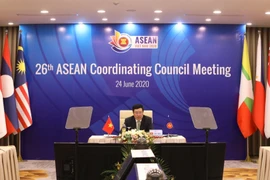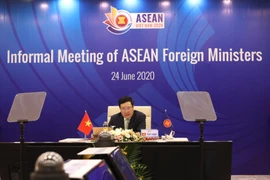Hanoi (VNA) – Leaders from the Association of Southeast Asian Nations (ASEAN)will gather at a special session within the framework of the 36th ASEAN Summit on June 26 to discuss women’s empowerment in the digital age forthe first time.
Thesession, initiated by Vietnam, aims to affirm the ASEAN leaders’ commitment topromoting gender equality and women’s role in the building of the ASEANCommunity and socio-economic development of the bloc.
Italso marks the 25th anniversary of the Beijing Declaration andPlatform for Action.
Atthe third ASEAN Ministerial Meeting on Women (AMMW), themed “Social Protectionfor Women and Girls: Toward the ASEAN Community Vision 2025” in Hanoi in 2018, PrimeMinister Nguyen Xuan Phuc said women and girls play an important role in theASEAN Community building, noting each of them must have equal rights in bothfamily and society.
SinceASEAN was established in 1967, women have made significant contributions to thegrowth and prosperity of the member countries.
Theyhave worked hard to improve their role and position, with the establishment ofthe ASEAN Community Women’s Circle in Hanoi in 2015, grouping wives and femaleofficials of the Vietnamese Ministry of Foreign Affairs and representativeoffices of the ASEAN member countries in Hanoi.
Overthe past five years, the group has organised a range of cultural activities andpeople-to-people exchanges, contributing to enhancing intra-bloc connectivity.
TheASEAN Women for Peace Registry (AWPR) was also formed in the Philippines in2018 to promote women’s participation and contributions to the peace processes,the settlement of traditional and non-traditional security challenges emergingin the region, and the implementation of ASEAN leaders’ Joint Statement onWomen, Peace and Security in 2017.
Vietnamis one of the countries that have gained remarkable achievements in genderequality, which have contributed to spurring national socio-economic development.
Topromote gender equality and increase social security for women and girls, thegovernment has implemented and integrated relevant regional initiatives andpriorities into national programmes and projects.
Itspends about 2.6 percent of the national gross domestic product (GDP) each yearon policies and programmes on social assistance, covering women and girls.
Thecountry has made efforts in implementing the Law on Gender Equality 2006 andthe UN Convention on the Elimination of All Forms of Discrimination againstWomen.
Anational strategy on gender equality for 2011-2020 has been promulgated withthe aim of raising public awareness of gender equality, narrowing gender gapand improving women’s position.
Thereare more women engaging in political activities at all levels, with the rate offemale parliamentarians reaching 27.1 percent, higher than the global figure of23.4 percent and the Asian rate of 18.6 percent.
Vietnamhas a National Assembly Chairwoman and three female Politburo members for thefirst time.
Notably,the first Vietnamese female officers have joined UN peace-keeping missions.
Vietnamesewomen have also proven their role in business and other spheres, with the rateof female labourers standing at 48 percent.
Still,Vietnam is continuing to perfect its relevant policies and laws, and optimiseresources to ensure gender equality and women’s empowerment./.




























